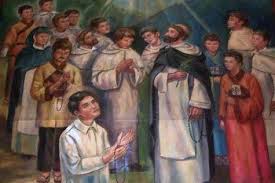This is not the stuff of which martyrs are made – So purportedly said Thomas More, who loved all the good things of life, his home at Chelsea, filled with his family, his books, and boon companions. The last thing he likely wanted to do was die for what was then an abstruse point of papal supremacy. But God has His designs for each one of us, and it is only in His will that our peace, and our salvation, may be found.
The two saints we celebrate today were also laymen, living their lives in the midst of the world, but who were asked to ‘go higher’, making them the ‘stuff of which martyrs are made’.
Saint Lorenzo Ruiz (+1637) was born of a Chinese father and a Filipino mother, raised piously in the Catholic Faith which had been brought to the Philippines by Dominican missionaries, whose Masses he would serve. His beautiful handwriting landed him employment as an escribano, an ecclesiastical scribe and calligrapher (would we had such jobs nowadays). He married, settled down, and was raising three children when he was mysteriously accused – falsely it seems – of killing a Spaniard, so he sought asylum aboard a ship with some Dominican priests, which was on its way to Japan.
It was thus that Lorenzo ended up being a sort of unintended missionary, bringing the Faith to the island of the Rising Sun, which had yet to accept the Son. The Shogunate was persecuting Christians – this was the era depicted in Shusako Endo’s controversial book (and eventual film) Silence – and the would-be missionaries were thrown into prison, then tortured on and off for the next two years, in an unrelenting attempt to force them to renounce their Faith.
But they all stood fast. Brought to Nagasaki, where many Catholics had witnessed for the Faith, the same city centuries later bombed by the Americans, they suffered in much the same manner as the semi-fictional protagonists in Endo’s novel. Unlike that sad, ironic story of apostasy, however, Lorenzo and his friends quite literally hung on to the end. The tsurushi – a method of execution in which the victim is strung up upside down over a sewer pit, till blood loss and asphyxiation took him – was one of the most unpleasant of deaths. The Japanese would leave one hand free, so he could signify with a simple gesture the renunciation of his Faith, and an end to the suffering. But Lorenzo refused to recant as his life blood ebbed away, a witness and example for us all, declaring before his death:
Ego Catholicus sum et animo prompto paratoque pro Deo mortem bibo. Si mille vitas haberem, cunctas ei offerrem…
I am a Catholic and with a prompt soul am prepared to taste death for God. If I had a thousand lives, I would offer them all…
The beatification of Lorenzo and his companions by Pope Saint John Paul II in 1981 was the first such ceremony held outside the Vatican, a sign of the universality of the universal Church; we truly are Catholic, in all that word means. Lorenzo was then canonized in 1987 by the same Pontiff, the first Filipino declared so, and his feast is a grand celebration in the archipelago nation.
We also celebrate on this day good King Wenceslaus (+935) the hero of the beloved Christmas song, based on an early Czech poem, the king who looked around for any of his people in need:
Good King Wencelsaus once went out, on the feast of Stephen,
As the snow lay round about, deep and crisp and even…

He was murdered by his own brother, in the era inappropriately known as the ‘Dark Ages’, but were in fact ages of great faith and learning. From what we know of Wenceslaus, he comes across as a noble and righteous ruler, and legend – which always is based on some truth – has him as the very prototype of a saintly king. His own grandfather had been converted by Saints Cyril and Methodius. When Wencelsaus’ father divided the kingdom between him and his brother, Wencelsaus, like Abraham of old, ensured his sibling got the larger half. But that did not satisfy the ambitous Boleslaus, who, with three dastardly companions, murdered Wencelsaus on the feast of Saints Cosmas and Damian, in a fit of dynastic jealousy on this day in 935, on the very steps of the church. Wenceslaus had been warned of the impending treachery and threat to his life, but he refused to stay home, and omit his usual devotions out of a vague fear of possible death. As today’s Office of Readings has Wenceslaus’ final day:










